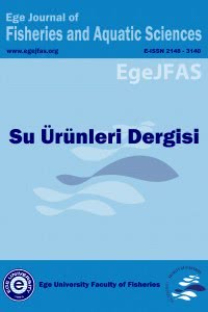Balık yağ asitlerinin insan sağlığı için önemi
diyetetik gıdalar, beslenme davranışı, yağ asitleri, deniz ürünleri, balık tüketimi, sağlık
The importance of fish fatty acids on human health
dietetic foods, feeding behaviour, fatty acids, seafoods, fish consumption, health,
___
Akyurt, İ., 1993. Fish feeding Technology (in Turkish), Atatürk Üniversitesi Ziraat Fak. ders kitabı, yayın no: 156, sf. 75, Erzurum.Anonim, S. Hepgül, 2002. http://www.kadinlar. com/genel sağlık/omega-3 htm.
Anonim, 2002. State Institute of Statistics Prime Ministry Republic of Turkey (in Turkish), Su Ürünleri İstatistikleri. ANKARA
Arnold, L. G., 2001. Alternative treatments for adult with ADHD annalys, The New York Academy of Science, vol. 931, pp 310-341.
Broughton, K. S., C. S. Johnson, B. K. Pace, M. Liebman, K. M. Kleppingerat, 1997. Reduced asthma symptomps with n-3 fatty acid ingestion are related to 5-series leukotrience production, American Journal of Clinical Nutrition, vol. 65, pp 1011-1017.
Calabrese, J. P., 1999. Fish oil and dipolar disorder, Archives of General Psychicatry, vol. 56, pp. 413-414.
Connor, W. E., 1995. Diabets, fish oil, and vasculae disease, Annals of Internal Medicine, vol. 123, no:12, pp 950-952.
Cunquer, J. A., 2000. Fatty acid analysis of blood plazma of patient with Alzheimer's disease, other type of dementia, and cognitive impairment, Lipids, vol. 35, pp 1305-1311.
Erkoyuncu, İ., 2000. Technology of chill and freze lesson notes (in Turkish), O.M.Ü. Su Ürünleri Fak., Sinop.
Gordon, D. T., V. Ratliff, 1992. The implications of omega-3fatty acits in human healty, Advances in Seafood Biochemistry Composition and Quality, Ed. By George L. Flick, 406 pp.
Gorga, C, 1998. A new selected comments on lipids, Quality Assurance of Seafood Appendix 1,245 sh.
Hagstrup, 1. P., 2001. Marine n-3 fatty acids, wine intake, and heart rate variability in patients referred for coronary angiography, Curcilation, vol. 103, pp 651-657.
Haris, W. S., 1997. N-3 Fatty acids and Serum Lipoproteins: Human Studies. American Journal of Clinical Nutrition, vol. 65 (5 Suppl), 16455-16545.
Hodge, L, 1996. Consumption of oily fish and chilhood asthma risk, Medical Journal of Australia, vol. 164, pp 137-140.
Holub, B. J., 1992. Potantial healt benefits of omega-3 fatty acits in fish, seafood science and technology, (Ed. By E. G. Bligh), Fishing New Books, pp 41-45.
Kolanowski, W., F. Swiderski, S. Berger, 1999, Possibilities of fish oil application for food products enrichment with omega-3 PUFA, Int. J. Food Sci. Nut. 50:39-49.
Leaf, A., P. C. Weber, 1988. Cardiovaskular effekts of n-3 fatty acids, N. Engl. J.Med., 318,549-557.
Lee, T. H., R. L. Hoover, J. D. Williams, R. J. Sperling, J. Ravalese, B. W. Spur, D. R. Robinson, W. Corey, R. A. Lewis. K. F. Austen, 1985. Effect of dietary enrichment with Eicosapentaenoic Acids on in vitro neutrophil and monocyte leukotrine generation and function. New. Eng. J. Med. 312-1217-24.
Nettleton, J. A., 2000. Seafood nutrition in the 1990's issues for the consumer, Seafood Science and Technology, chepter 4, Ed. By Graham Bligh Canadian. Inst. of Fish Tech., 32-39 pp.
Nicklas, T. A., J. Dwyer, H. A. Feldman, R. V. Luepker, S. V. Kelder, P. R. Nader, 2002. Serum cholesterol lever in children are associated with dietary fat and intake. Journal of The American Dietetic Association, vol. 102, number4. p.511-517.
Norrish, A. E., 2000. Prostate canser rise and consuption of fish oil, a dietarybiomarker based case-control study, British Journal of Canser, vol. 81, no. 7, pp 1238-1240.
Oğuz, A., 2000. Plazma lipoproteins and their mesurement methods, hiperlipidemia ve aterosklerosis (in Turkish), sf. 30-31.
Pigott, M. G., B. W. Tucker, 1990. Seafood effekts of technology on nutrition, 331 pp. Schacky, C, P. Angerer, W. Kathny, 1999. The effect of dietary omega-3 fattyacids on coronary atherosclerosis. A randomised, double-blind, placebo-controlled trial. Ann. Internal. Med.130:554-562.
Schacky, C, 2000. n-3 fatty acids and the prevention of coronary atherosclerosis, American Journal of Clinical Nutrition, vol. 71, pp 224- 227.
Sidhu, K. S., 2003. Healt benefits and potential risk related to consuption of fish or fish oil. Regulatory Toxicology and Pharmacology, 38., 336-344 p.
Stoll, A. L., 1999. Omega-3 fatty acids in bipolar disorder, Archives of General Psychiatry, vol. 56, pp. 407-412.
Stone, J. N., 1996. Fish consumption, fish oil, lipids and coronery hearty disease, America Heart Association, 94:2337-2340.
Suzuki, H., K. Okazaki, S. Hayakawa, S. Wada, S. Tamura, 1986. Influnece of commercial dietary fatty acids on PUFA of cultured freshwater fish and comparison with those of wild fish of the same species, J. Agric. Food Chem. 1986,34,58-60.
Tanscanen, A., 2001. Fish consuption, depression, and suicidatily in a general population, Archives of General Psychiatry, vol. 58, pp 512-513.
Thomgren, M., A. Gustafson, 1981. Effect of 11 weeks increases in dietary EPA and bleeding time, lipids, and platelet aggregation, Lancet, vol. 2, pp 1190-1193.
Yücecan, S., S. Baykan, 1981. Food Chemistry, Food control and Analyses (in Turkish), M.E.B. Temel Ders Kitabı, Yayın No:5, s.51-53, İstanbul.
- ISSN: 1300-1590
- Yayın Aralığı: 4
- Başlangıç: 1984
- Yayıncı: Aynur Lök
A morphological study (SEM) on a parasitic copepod; Lernanthropus kroyeri van Beneden, 1851
İsmet ÖZEL, Ahmet ÖKTENER, HALİM VEDAT AKER
Levrek yavrularında (Dicentrarchus labraw L., 1758) vibriozise karşı aşı geliştirilmesi
İzmir Körfezi' nde karides balıkçılığında kullanılan uzatma ağlarının av kompozisyonu
Antalya Körfezi' ne dökülen akarsuların balık faunası
T. Tansel TANRIKUL, HAŞMET ÇAĞIRGAN, Erol TOKŞEN
Su ürünlerinin modifiye atmosferde paketlenmesi
Alev HALIKI, GÜVEN ÖZDEMİR, Ataç UZEL
Sodyum nitrat uygulamasının toprak havuzlardaki taban sedimentlerine etkileri
Denizsel organizmalardan elde edilen yeşil florensans protein (GFP) ve kullanım alanları
